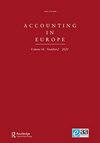The Impact of IFRS 16 on Key Financial Ratios: A New Methodological Approach
IF 4.6
Q1 BUSINESS, FINANCE
引用次数: 51
Abstract
In January 2016, the International Accounting Standards Board issued a new standard for lease accounting: International Financial Reporting Starndard (IFRS) 16. IFRS 16 will lead to the capitalisation of the majority of current operating leases by lessees. We analyse the impact of the new accounting model on entity’s key financial, contributing to research by making significant changes in the Imhoff et al. [(1991). Operating leases: Impact of constructive capitalization. Accounting Horizons, 5(1), 51–63. Retrieved from http://search.ebscohost.com/login.aspx?direct=true&db=buh&AN=9604010111&site=ehost-live; (1997). Operating leases: Income effects of constructive capitalization. Accounting Horizons, 11(2), 12–32. Retrieved from http://0-search.proquest.com.fama.us.es/docview/208896121?accountid=14744] methodology used by previous authors. We change how the lease term is estimated (more aligned with the final approved standard), and how the discount rate is obtained. Furthermore, we use a more comprehensive sample (646 quoted European companies). In line with previous research we find important systematic impacts on key balance sheet financial ratios (mainly leverage ratios), on a magnitude that depends on the operating lease intensity of the sector in which the entity operates. Our estimated impact is generally higher than that obtained in previous studies. The most affected sectors are retail, hotels and transportation. We do not find a consistent result with regard to the effect on profitability ratios.IFRS 16对关键财务比率的影响:一种新的方法论方法
2016年1月,国际会计准则委员会发布了新的租赁会计准则:国际财务报告准则(IFRS)16。《国际财务报告准则第16号》将导致承租人对大多数当前经营租赁进行资本化。我们分析了新会计模式对实体关键财务的影响,通过对Imhoff等人[(1991).经营租赁:推定资本化的影响.会计视野,5(1),51-63。检索自http://search.ebscohost.com/login.aspx?direct=true&db=buh&AN=9604010111&site=ehost-生活;(1997年)。经营租赁:建设性资本化的收入效应。会计视野,11(2),12-32。检索自http://0-search.proquest.com.fama.us.es/docview/208896121?accountid=14744]以前的作者使用的方法。我们改变了租赁期限的估计方式(更符合最终批准的标准),以及如何获得贴现率。此外,我们使用了一个更全面的样本(646家被引用的欧洲公司)。根据之前的研究,我们发现对关键资产负债表财务比率(主要是杠杆比率)的重要系统性影响,其程度取决于实体经营所在行业的经营租赁强度。我们估计的影响通常高于先前研究中获得的影响。受影响最大的行业是零售业、酒店业和运输业。关于对盈利率的影响,我们没有发现一致的结果。
本文章由计算机程序翻译,如有差异,请以英文原文为准。
求助全文
约1分钟内获得全文
求助全文

 求助内容:
求助内容: 应助结果提醒方式:
应助结果提醒方式:


